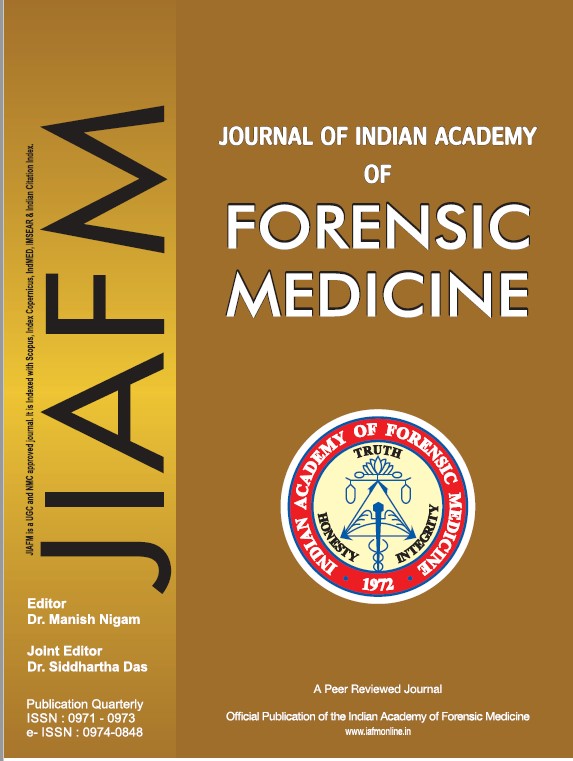Estimation of Age from Cranial Suture Fusion- an Autopsy based Study
DOI:
https://doi.org/10.48165/jiafm.2024.46.1(Suppl).2Keywords:
Acsadi-nemeskeri scale, Age estimation, Cranil sutures, Ectocranial fusion, Endocranial fusion, Forensic anthropologyAbstract
The need for identification of a deceased arises in civil and criminal cases. Skull being a whole compact bone is almost always the best preserved and the one that could be best utilised. Over the years, there has been enough and more controversies regarding the methodology and predictability of the same. The primary objective of the study was to estimate age from fusion of cranial sutures in wet specimens of cranial vault during autopsies. Cross sectional study was done at Department of Forensic Medicine, Government Medical College Thiruvananthapuram for a period of one year after approval from Institutional Ethics Committee. The study sample of 168 was divided uniformly among each decade from 11-80 years, thus coming to 12 males and females in each. Fusion of cranial sutures were scored both endocranially and ectocranially using the Acsadi- Nemeskeri scale. Reliability of various subdivisions of each cranial suture were assessed. Regression formulas from various cumulative scores were then formulated. There was no significant variation in fusion of cranial sutures between males and females. Every subdivision of each cranial suture showed variation with age and cannot be used as a good predictor of age. The cumulative scores of endocranial subdivisions, ectocranial subdivisions, subdivisions around Bregma and Lambda showed uniform distribution and reliability of prediction. Greatest predictability was from the sum of endocranial scores. The methodology in determining age from cranial suture fusion is of utmost significance in establishing identity. An objective scoring technique is more dependable than a subjective analysis.
Downloads
References
Iscan MY, Steyn M. The Human Skeleton in Forensic Medicine. 3rd ed. Illinois: Charles C Thomas; 2013.
Krogman WM, Iscan MY. Human Skeleton in Forensic Medicine. 2nd ed. Springfield: Charles C Thomas; 1986.
Payne James J, Jones R M , Karch S, Manlove J. Simpsons Forensic Medicine. 13th ed. London: Hodder and Stoughton Ltd; 2011.
Singer R. Estimation of age from cranial suture closure: report of its unreliability. J Forensic Med. 1953;1:52–9.
Brooks. Skeletal age at death : Reliability of cranial and pubic age indicators. Am J Phys Anthropol. 1955;13:567–97.
Hershkovitz, Latimer, Dutour, Wish-Baratz R. Why do we fall in aging the skull from the sagittal suture. Am J Phys Anthropol. 1997;103(3):393–9.
Acsadi Gy. Nemeskeri J. History of human life span and mortality. 1st ed.Budapest: Akademiai Kiado; 1970.
Meindl RS, Lovejoy CO. Ectocranial suture closure: a revised method for the determination of skeletal age at death based on the lateral-anterior sutures. Am J Phys Anthropol. 1985;68 (1):57–66.
Todd TW, Lyon Jr.DW. Suture closure - its progress and age relationship. Part IV. Ectocranial closure in adult males of Negro stock. Am J Phys Anthropol.1925; 8(2):149–68.
Karmakar RN, Mukherjee's JB. Forensic Medicine and Toxicology. 5th ed. Kolkata: Academic Publishers; 2018.
Nandy A. Principles of Forensic Medicine and Toxicology.3rd ed. Kolkata. New Central Book Agency (P) Ltd; 2010.
Patil T L, Bhargava, Qureshi AA. The study of cranial suture closure of the vault. J Anatomical Society of India. 1981;2:30–38.
Shetty U. Macroscopic study of cranial suture closure at autopsy for estimation of age. Anil Aggrawal's Internet J Forensic Med. 10(2):1–95.
Vijay Kumar AG, Agarwal SS, Bastia BK. Shivaramu MG, Honnungar RS. Fusion of Skull Vault Sutures in Relation to Age-A Cross Sectional Postmortem Study Done in 3rd , 4th & 5th Decades of Life. Journal of Forensic Research. 2012;3(10):4–6.


